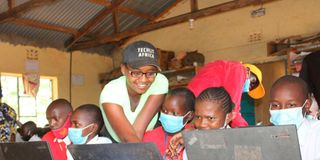Bridging the digital divide, one rural school at a time

What you need to know:
- Nelly says that the greatest challenge she encounters is high taxation levied on the importation of computers and other electronic machines for young learners.
- “Kenya charges 25 per cent import fee on computer value in addition to 16 per cent VAT yet these devices are meant to empower children,” she notes.
- Her plan is to construct even more computer laboratories in rural schools not just in Kenya, but across Africa.
Technology is changing every facet of our day-to-day life. However, due to the digital divide, many children and young people are unable to compete favourably against their peers across the globe due to lack of knowledge and ability to use computers.
Nelly Cheboi, a software engineer, is taking a bold step to change this. In 2014, she founded TechLit Africa, a non-profit organisation that is empowering school going children and youth in villages with digital skills so that they can take up jobs in the digital world.
Her organisation sources for second-hand laptops and computer devices from well-wishers then ships them to learning centers in rural areas. This is in a bid to equip disadvantaged learners with digital skills so that they can find employment more easily.
Born and bred in Mogotio, Baringo County, the 28-year-old understands the struggles that school going children in rural areas have to contend with.
“I grew up in abject poverty. In Grade Six, I watched as my mother struggled to support our family. This really motivated to do well in academics so that I could support my mother and siblings,” observes Nelly, a computer science graduate.
In 2012, Nelly received a scholarship to study at Augustana College in the US through Zawadi Africa Foundation that supports bright and needy school going children. Although, she initially got an opportunity to pursue a course on chemistry, she later switched to computer science.
“It was while attending the computer science classes in college that I realised that I had very little knowledge on computing, unlike my peers. Like many Kenyans, I first interacted with a computer when I joined college. I wanted to change this narrative, and that is why I thought of empowering children with digital skills,” she says.
After working as a janitor on part-time basis, Nelly earned enough money to enable her construct a nursery school. She then equipped the school with computer devices.
“I was amazed that the school attendance greatly improved after we installed the computers. This motivated us to support more schools in the region to get the computer devices,” she recalls.
In 2015, she began building a computer laboratory at her former school, Mogotio Primary School, which was opened the following year.
Some of the learning centers that have benefited from Techlit include Zawadi Yetu School, St Mary’s and Logiri Primary School in Baringo. So far, they have supported 12 schools in building computer laboratories, hence positively affecting more than 5,000 school children.
Her organisation has also trained 20 tutors to empower the young ones with computer literacy skills and create the next generation of computer wizards.
“I want to eliminate poverty. I want to change children’s destinies. It is easy to equip young children with digital skills because they learn fast. If we invest in them, they will be able to take up jobs online and empower themselves and their families. There are so many jobs that require one to have these skills yet few have the knowledge,” she said.
Techlit tutors train young learners to code, animate and execute designs so that they can develop digital content and become self-employed in the digital space.
“Since there is no broadband internet around here, we download terabytes of content for our local servers including Wikipedia and Stack Overflow. We use this to train the young learners. We also teach young learners about the harmful impact of digital content,” says Nelly.
Recently, she was awarded the prestigious Richard Swanson Humanitarian award by her alma mater, Augustana College.
Nelly says that the greatest challenge she encounters is high taxation levied on the importation of computers and other electronic machines for young learners.
“Kenya charges 25 per cent import fee on computer value in addition to 16 per cent VAT yet these devices are meant to empower children,” she notes.
Her plan is to construct even more computer laboratories in rural schools not just in Kenya, but across Africa. She advises fellow youth to engage in initiatives that positively impact the community.
“From next year, I plan to put up 100 computer labs to support 40,000 children in the country. We also plan to also expand and open computer labs in Tanzania, Uganda and other countries in Africa,” she reveals.
Her advice to young people who want to create social impact within their communities?
“It is easy to get discouraged when you look at where you are and where you want to be. However, start with what you have. Along the way you will get people to assist you achieve it. I started Techlit with only one school.”





